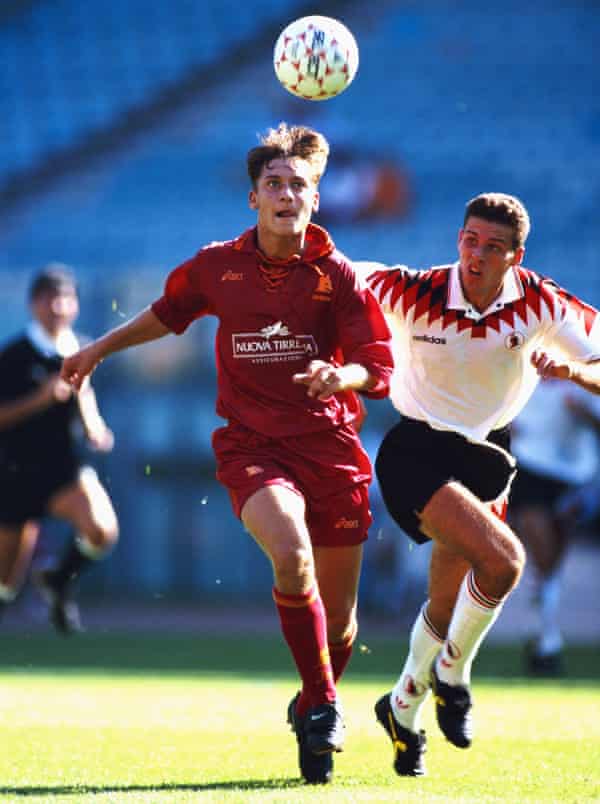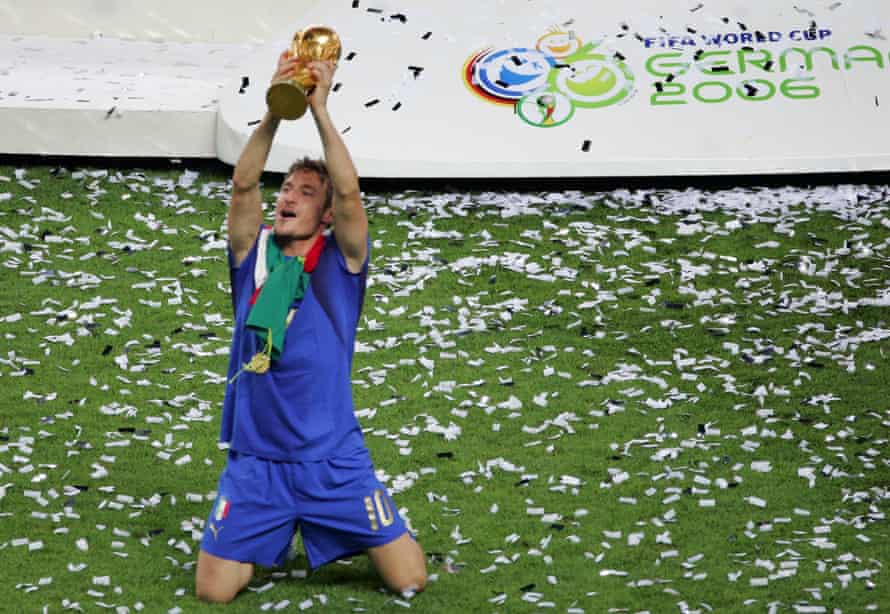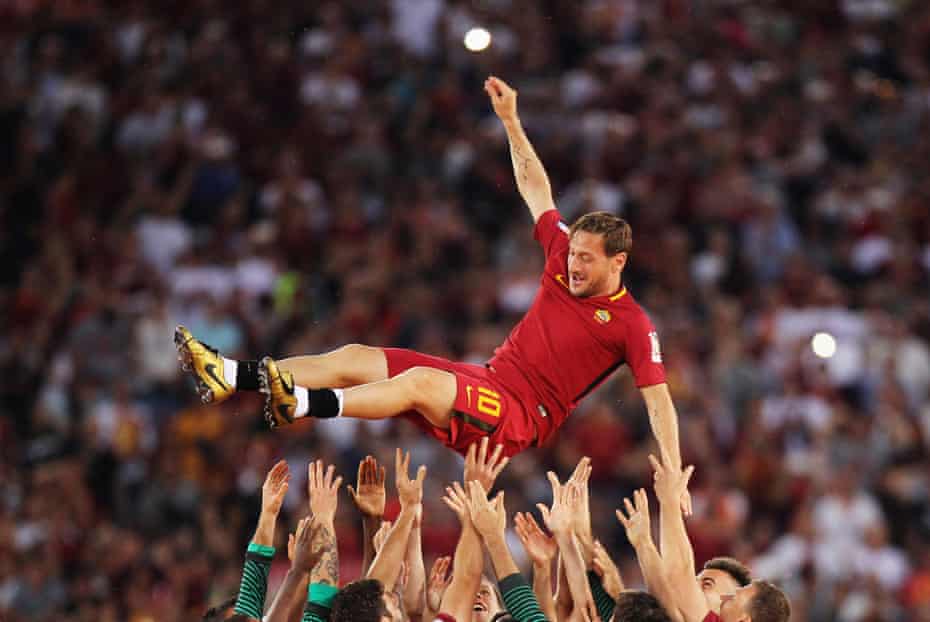Francesco Totti: ‘In my time soccer was made of affection. In the present day it’s extra enterprise’ | Roma

An hours after chatting that ranged from childhood TV favorites to the challenges of retirement, about the fate and “what if” moments that defined a career, I stumbled upon a topic that Francesco Totti was for keeps taboo. All that was needed was a question of whether he would let his 15-year-old son Cristian beat him at pinball.
“No!” he calls, staring at me with incredulous eyes from the other end of our zoom call. “Things have to be earned, not given!”
What other mindset could we expect from a man who has spent his entire career at one club and rejected opportunities to earn and win more elsewhere? Totti made his senior national team debut with Roma in 1992 and played there for a quarter of a century before retiring in 2017 with more than 300 goals.
Hailed by Diego Maradona as “the best player I have ever seen”, Totti has won a single Serie A title in all these years of club football, with two wins in the Coppa Italia and two more in the Supercoppa – Italy’s competition between league and cup winners. It’s no secret that he wishes he could have won more.
“But to sit here now and think about regrets – ‘I could have done that, I could have said that’ – I’m not like that,” emphasizes Totti. “I did my best and took everything I could make of it with me.”
Francesco Totti scores against Parma on the final day of the match when Roma win the 2001 Scudetto. Photo: Gabriel Bouys / AFP / Getty Images
There is something special about claiming even one Scudetto for your children’s team in the city where you were born. Totti previously said that a scudetto in Rome in another city is worth 10. The Roma have won Serie A three times in their 94-year history.
In his autobiography, newly published in English under the title Gladiator, Totti recalls how the celebrations for that title lasted through summer 2001 and beyond. For him it was even a higher climax than his other great career triumph when he won the 2006 World Cup with Italy.
“They call me crazy and they can’t accept it,” Totti writes in the book. “Because the World Cup is of course the highlight of any career, but that applies more to those who win.” [titles] every year like [Juventus players]than for those who almost never win. For us, the Scudetto is the best, and my biggest criticism is that I didn’t win at least a second. “
It’s the perspective of a football player who was also a fan – a Romanista and perhaps more importantly a Roman. “The city you were born in is always the most beautiful,” he says. “That goes for everyone – the place where you come from has a different charm. Even if Rome is really the most beautiful city in the world for me … In the end we are all the same. Some more, some less. “
Totti is what the Italians call a bandiera – a footballer whose dedication to his club is so great that he becomes his “flag”, a living symbol. As money has poured into the game and freedom of movement has increased in the years since the 1995 Bosman ruling, they have become increasingly rare.
 Francesco Totti (left) in action against Foggia in September 1994. Photo: Shaun Botterill / Getty Images
Francesco Totti (left) in action against Foggia in September 1994. Photo: Shaun Botterill / Getty Images
“I started at different times. A different kind of football, ”says Totti. “A football out of love, out of affection for the fans. When I played for the team I’ve always supported, it was a lot easier for me to make that choice. 25 years in a team is no small feat, and as a captain, as one of the most important players, you always have to compete. But making a comparison between my time and today is difficult. Today it’s more business. You go where you can make more money. And that’s fair enough, isn’t it? “
When you hear Totti explain it, you’d think he retired four decades ago, not four years ago. He too had an opportunity to follow the cash. When Real Madrid made his final push to sign him in 2006, he recalls a deal that would have made him the highest-paid player in the world.
It was one of three occasions when Totti’s career and life could have headed in a different direction. He defines them as his “sliding doors” moments after the 1998 Gwyneth Paltrow film, which he was a huge fan of.
When sports director Ariedo Braida showed up on his family’s doorstep, the opportunity arose for the first time to join Milan’s youth system – before leading clubs in Rome had shown such interest. Next came the 1996–97 season when Roma hired a manager, Carlos Bianchi, to sign Jari Litmanen to take Totti’s place. Most recently, the big offer came from Madrid.
When reading the book, I had the impression that Totti could have easily passed the first sliding doors. The decision to deny Milan was made together with his parents, who took advice from a friend of the Italian Football Association.
Milan had just won Serie A and for Totti they were “the most exciting team I have ever seen, the only one I dreamed of playing in”. If his parents had thought a check for $ 150 million
“Honestly no. The decisions were always made by me, with my own head. Often your parents give you advice. And it is right to listen to them. But in the end I knew that I was so young, that I had time and a Had a future ahead of me. “
 Francesco Totti celebrates the 2006 world title, Photo: Roberto Schmidt / AFP / Getty Images
Francesco Totti celebrates the 2006 world title, Photo: Roberto Schmidt / AFP / Getty Images
Madrid was a different matter. Totti was shortly before his 30th birthday in the summer of 2006 and already as a newly crowned world champion knew that certain chances would not last forever. They had tried to sign him five years ago, but back then the Giallorossi had refused their advances without waiting to see how he felt.
“Of course I thought about it,” says Totti. “Let’s say there were a few days when we were one foot in and one foot out. Then I have often and truthfully said that the decision to stay with Roma was made from the heart. In those moments when you feel like this, you can’t go away. “
More than ever before in our conversation, Totti seems to choose his words consciously, to clear his throat and to consider for a moment how he would like to formulate a thought. “But in retrospect, when you think about saying no to Real Madrid, there are still a few doubts.
“Real Madrid were the only other team I could have played for. The only team that it could have been, I think. An experience in another country could have been something nice for everyone. For my family. To me …”
With perfectly imperfect timing, that thought is broken by a shaky internet connection. When it returns, that hint of sadness will be gone. Totti reminds me, and maybe even himself, that his decisions were always his own. “If you make a decision with your own head, it can never be a wrong decision. Do not you think?”
More than once, Totti returns to the word “destino” – fate – while talking about these crucial moments in his life and career. He’s not fatalistic. “A fate awaits us, but you still have to claim it,” he says. “You live for the day, you live what lies ahead of you. But step by step you understand that things are waiting for you. “
It’s a noticeably similar worldview to the one that his former Italy team-mate Gigi Buffon conveyed to me in another interview. Totti laughs when I point it out. They have been friends since they met when they played for Italy’s U14. For Totti it was about a trip together. Although they lived in different parts of the country and played for different teams, “we grew up on the same street”.
 The Roma players lift Totti after his last game for the Giallorossi 2017. Photo: Paolo Bruno / Getty Images
The Roma players lift Totti after his last game for the Giallorossi 2017. Photo: Paolo Bruno / Getty Images
Buffon is still struggling to retire and is returning this summer to play in Serie B for his first club, Parma. Despite everything Totti defies the word “regret” there is an unshakable feeling that he wishes he had found a similar autonomy to define how his playing career ended.
In Totti’s story, Roma briefly informed him that his time was up and asked before a game against Lazio in spring 2017 if he would like to say a few words before his last derby. For a person who finds such clarity in having the choices they made of their own free will, this loss of autonomy has been difficult to accept.
“You never really want to stop,” says Totti, perhaps unconsciously making his own experience universal. “To be honest, I didn’t take it well at the beginning. But slowly I started to think that it was the right thing to do. “
There’s no sadness, Totti points out, about the club’s failure to bring him back to another role, though it may be a matter of semantics. “It certainly doesn’t make me happy because I’ve always put Roma above everything and everyone. But like I said, that’s fate, I think… If you then called me one day, we’d have to talk things over and see. “
His focus is currently on the sports consultancy he founded with branches for player search and talent management. “The main goal right now is to find promising young players. I don’t know if it will be easy, but I will try everything to be successful. “
The question of whether he will try to impart his wisdom to the young players is answered with a wave of no. “No lessons!” he insists. “There are things that you either carry with you or you will find it difficult to reach a certain level. Of course, with determination, desire, and sacrifice you can accomplish some goals. But to be a talent, you have to have that in you. You can’t work to become a talent. “
We’re back to fate and maybe even my question about pinball. My subsequent comment that Cristian would enjoy an eventual victory more because he knows that his father didn’t have it easy is met with a grin. “We’ll see,” says Totti with the relaxed expression of a man who doesn’t expect to be dethroned anytime soon. “Let’s hope in him!”
Francesco Totti’s Gladiator is published by deCoubertin Books and is available immediately. Order a copy here.
